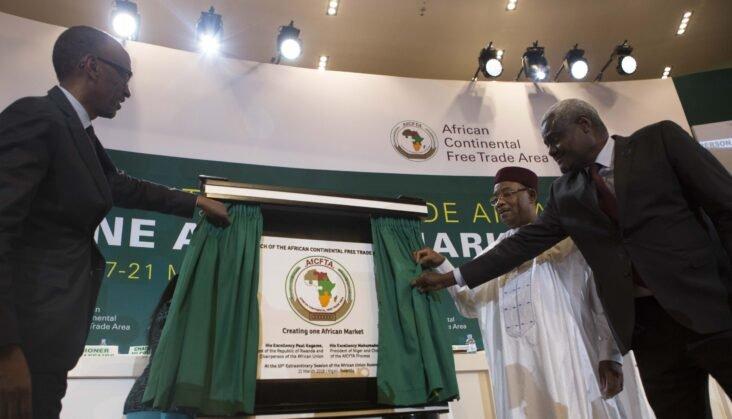Africa-Press – Botswana. Africa celebrated the official launch of the world’s largest customs union – the African Continental Free Trade Area (AfCFTA) – a little over a year ago, ushering in a new era of pan-African trade.
But this is just a step in a longer journey. To fully recognise the benefits of free trade and guarantee AfCFTA’s success, private sector empowerment and investment on the continent must take centre stage.
The Current Problem
At a time when global transport and logistics systems are being disrupted and trade wars are raging, relying on the rest of the world for essentials has proven to be a risky bet. Africa learned this the hard way during the Covid-19 pandemic, with just 11% of Africans being fully inoculated against the virus due to inequitable vaccine distribution. The world is realising this again with the war in Ukraine and its impact on the price of oil and food security.
Removing barriers to cross-border trade and championing the creation of regional manufacturing hubs that can produce vaccines and other essential goods is an urgent priority for Africa, and important progress is already being made across the continent.
The Solution
Private sector investors are joining forces with development partners to promote vaccine manufacturing in Africa, for Africa. In Rwanda, for example, the International Finance Corporation (IFC) is working alongside the government, kENUP, BioNTech, and several other development finance institutions and partners to establish integrated manufacturing capabilities for Covid-19, anti-malaria, tuberculosis, and other widely used vaccines.
In the last two decades, intra-African trade not only increased in volume but also in quality. Goods traded within Africa are more diverse and of higher value addition than those traded with the rest of the world.
This is also the case in Senegal, where the IFC is supporting the Institut Pasteur in Dakar to raise funding for the construction of a regional vaccine production unit. These vaccine manufacturing initiatives are also strengthening production capacity, building technical skills, and providing best practices for supporting similar initiatives on the continent that could be replicated by other sectors.
The trends beyond vaccines are also positive. In the last two decades, intra-African trade not only increased in volume but also in quality. Goods traded within Africa are more diverse and of higher value addition than those traded with the rest of the world.
Private-Public Partnership
The AfCFTA provides us with an opportunity to go even further. Progress in negotiations and ratifications has been fast, and the recent agreement on rules of origin is a great step in the right direction.
But the fate of the AfCFTA doesn’t only rest in the hands of the public sector. For free trade to truly reach its full potential, it must be coupled with private sector investments that bridge the infrastructure and connectivity gap and give African businesses the tools and resources they need to compete in African markets. By promoting competition and attracting private capital, states will be able to develop transportation networks, bolster internet connectivity, and surf on the wave of digitalisation sweeping across Africa.
The private sector also has a pivotal role to play in building reform momentum for trade and accelerating the implementation of AfCFTA. Private sector alliances between businesses from different countries are uniquely positioned to convince and demonstrate that facilitating cross border trade, addressing non-tariff barriers, and harmonising policies and regulations will transform the continent.
The IFC, as the private sector arm of the World Bank Group, is focused on helping companies make the most of AfCFTA. We recognise that for Africa to trade with Africa, trade finance is essential, ensuring that buyers receive their goods and sellers receive their payments.
Despite significant progress in recent years, Africa is very much at a crossroads.
Without it, goods and services are less likely to move across borders, and it becomes harder for businesses to innovate, create jobs, and drive economic growth. So, the IFC has committed $17bn to ease cross-border transactions in the region to date and earmarked another $2bn in recent months as part of a massive new effort to promote trade finance and support micro-, small-, and medium-sized enterprises.
Despite significant progress in recent years, Africa is very much at a crossroads. Almost one-quarter of signatories have not ratified AfCFTA, and full implementation isn’t scheduled until 2053. Given the monumental task ahead, this is no time to take our feet off the gas pedal. Africa’s recent history is flecked with trade deals that failed to deliver on their potential. For this one to be different and make good on its promises to connect 1.3 billion people across 54 countries to markets and opportunities, the private sector – the backbone of Africa’s economy – must be in the driver’s seat.
For More News And Analysis About Botswana Follow Africa-Press






